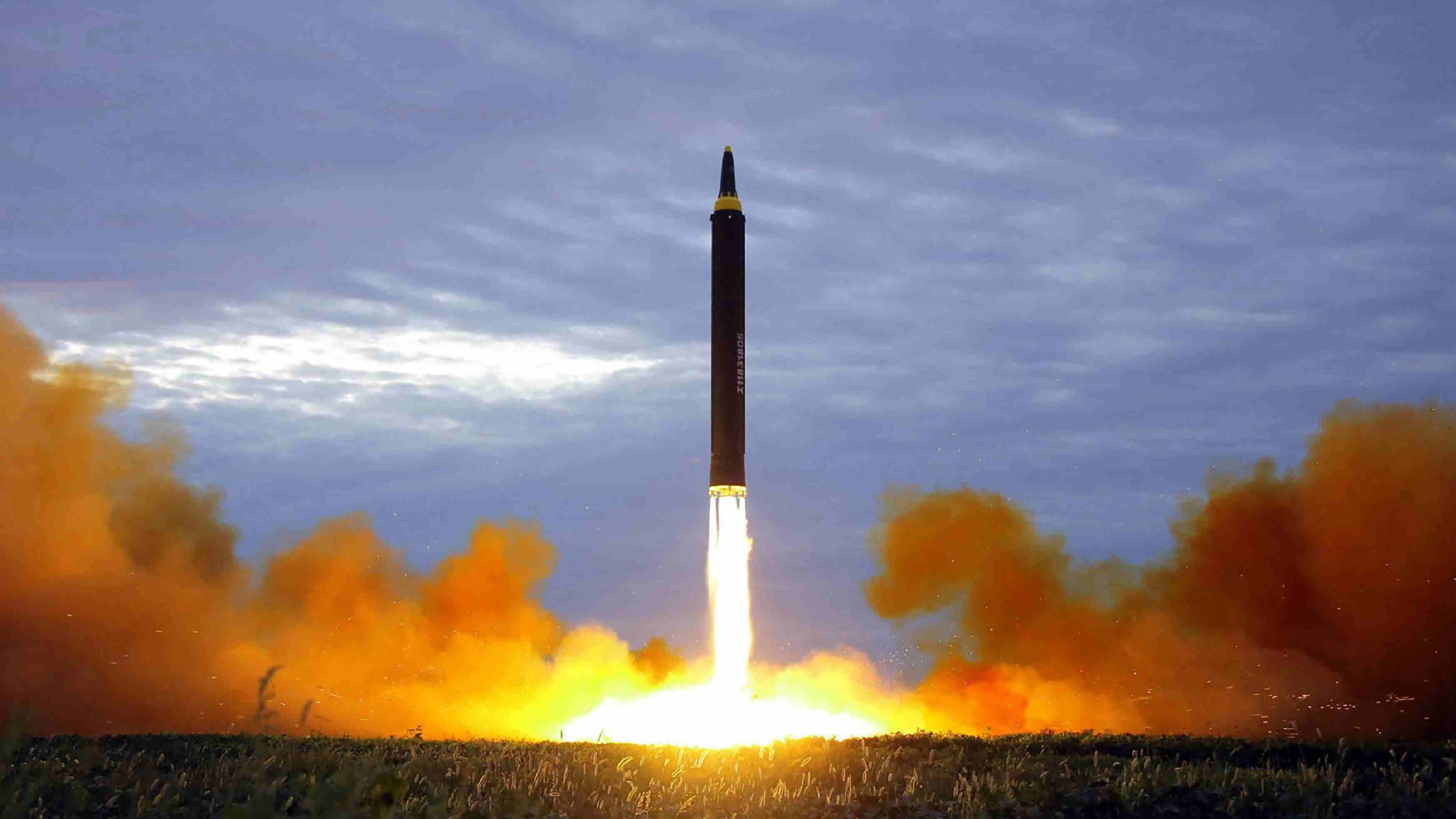In responding to the tense situation on the Korean Peninsula, the US-South Korea and US-Japan alliances have been strengthened.
Some US strategists even advocate the US allow South Korea and Japan to develop nuclear weapons. Chinese and Russian analysts have shown deep concerns about this trend.
In the last few months, the Democratic People's Republic of Korea (DPRK) has conducted several ballistic missile tests and one nuclear test. Whether Washington will provide security guarantee to its allies has become a key concern in Seoul and Tokyo.
In contrast to previous administrations, US President Donald Trump has adopted a transactional approach when it comes to dealing with alliance relations. Trump argues that the US has invested too much in safeguarding its allies’ security, criticizing South Korea and Japan for a huge surplus in trade with the US.
Recently, Trump also called for a withdrawal from its free-trade agreement with South Korea.
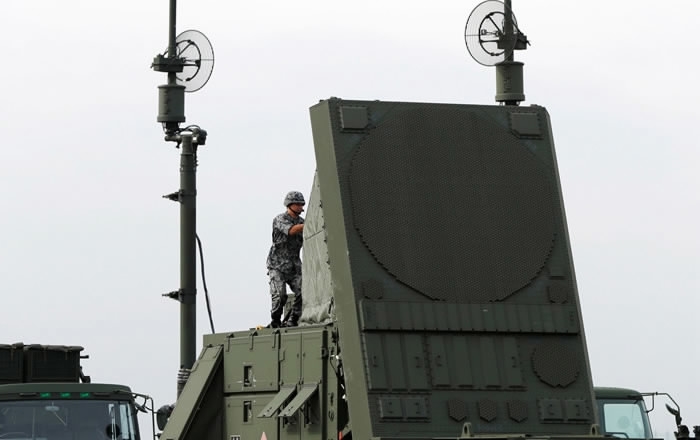
A Japan Self-Defense Forces soldier takes part in a drill to mobilize their Patriot Advanced Capability-3 (PAC-3) missile unit in response to a recent missile launch by the DPRK, at US Air Force Yokota Air Base in Fussa on the outskirts of Tokyo, Japan, on August 29, 2017. /Reuters Photo
A Japan Self-Defense Forces soldier takes part in a drill to mobilize their Patriot Advanced Capability-3 (PAC-3) missile unit in response to a recent missile launch by the DPRK, at US Air Force Yokota Air Base in Fussa on the outskirts of Tokyo, Japan, on August 29, 2017. /Reuters Photo
Since July, Trump, President of South Korea Moon Jae-in and Prime Minister of Japan Shinzo Abe have sought stronger communication with each other in the hope of coordinating their stance toward Pyongyang.
As Trump and Moon consulted on the sidelines of the UN General Assembly, both sides have agreed to take a tougher approach. Moon and Abe also met during the third Eastern Economic Forum in Vladivostok, Russia.
The coordination between Washington, Seoul and Tokyo has gone to a deeper level in terms of military cooperation. They have conducted joint military drills with strategic bombers and nuclear submarines.
The Terminal High Altitude Area Defense missile defense system has been deployed on South Korean soil. South Korea even proposed the purchase of billions of dollars’ worth of US military equipment and asked the US to deploy tactical nuclear weapons. Japan suggested installing the land-based Aegis anti-missile system.
South Korea and Japan also announced an extension of their General Security of Military Information Agreement for one year.
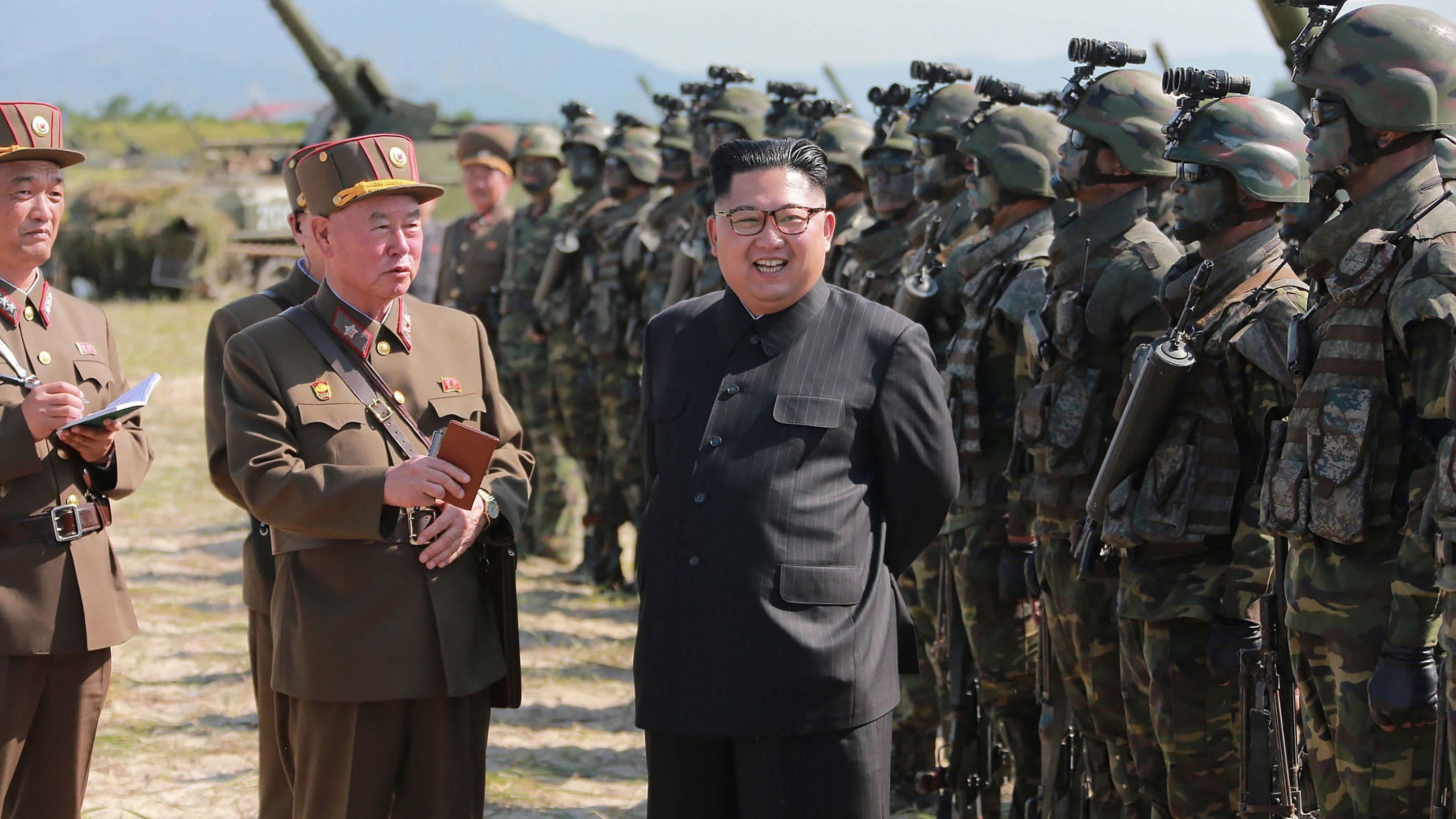
This undated photo released by the DPRK's official Korean Central News Agency (KCNA) on August 26, 2017 shows leader Kim Jong Un presiding over a target strike exercise conducted by the special operation forces of the Korean People's Army (KPA) at an undisclosed location. /AFP Photo
This undated photo released by the DPRK's official Korean Central News Agency (KCNA) on August 26, 2017 shows leader Kim Jong Un presiding over a target strike exercise conducted by the special operation forces of the Korean People's Army (KPA) at an undisclosed location. /AFP Photo
The strengthening of the alliance between the US, South Korea and Japan has profound domestic political reasons. Trump hopes a strong leadership image will ease domestic pressure.
Moon, who used to favor dialogue with the DPRK to alleviate tensions, now has to tighten his alliance with the US to calm hardliners and the military.
The goal of Abe’s administration is to make full use of the DPRK nuclear crisis to amend its constitution and upgrade Japan’s armaments.
A stronger alliance among the three countries will exert a very complicated influence on Northeast Asian regional security.
The idea of reintroducing tactical nuclear weapons is obviously dangerous and counterproductive. The US Navy’s long-range nuclear strike capability is enough to deter and destroy the DPRK. Allowing the US Forces stationed in South Korea to regain tactical nuclear weapons sends a signal that the US will wage war against the DPRK.
Besides the potential overreaction from the DPRK, it will spark anti-nuclear sentiments among people in South Korea and Japan, and provoke strategic suspicions from China and Russia.
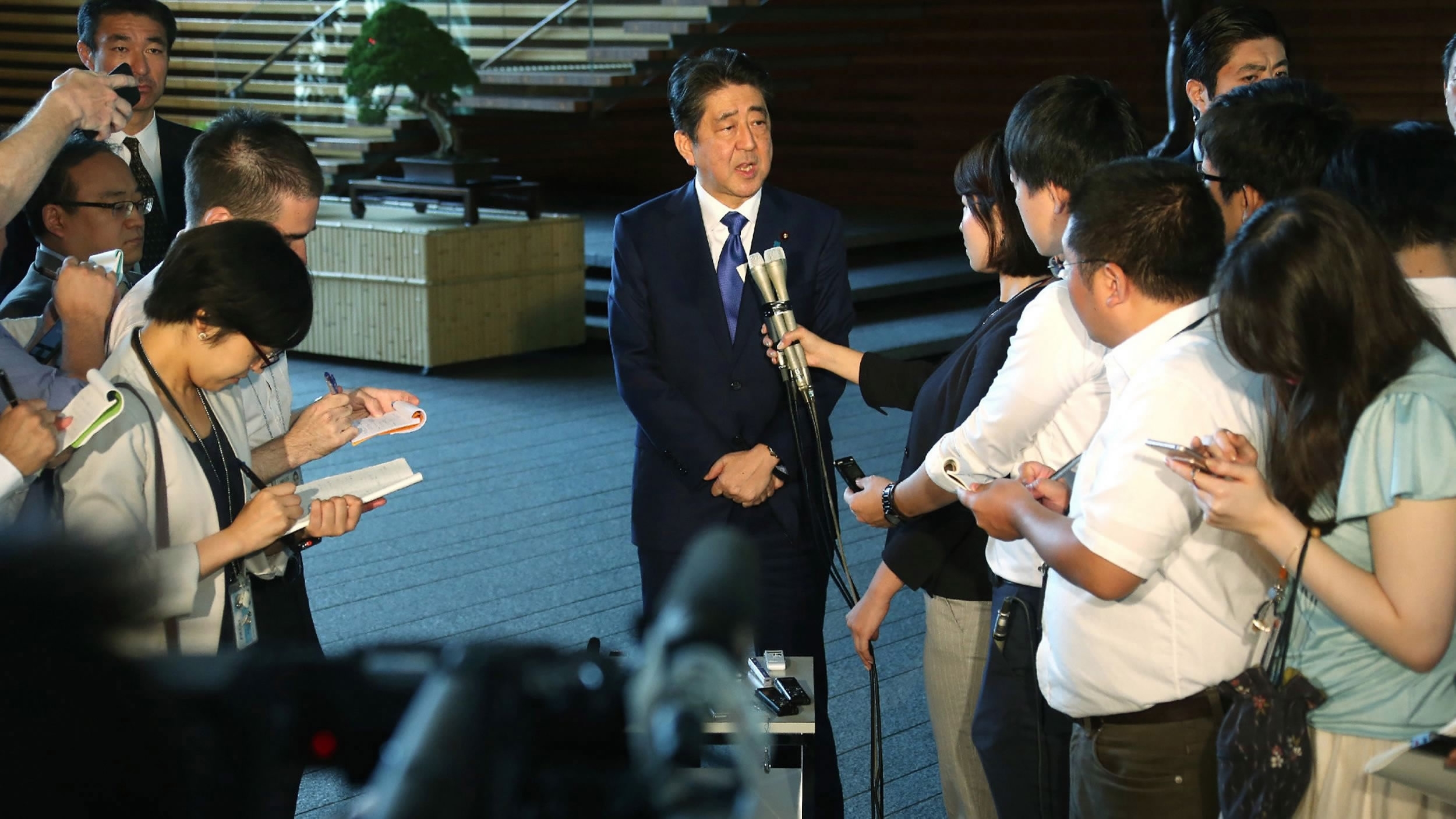
Japanese Prime Minister Shinzo Abe (C) speaks to the media at his official residence in Tokyo on July 4, 2017, after a ballistic missile was launched by the DPRK. /VCG Photo
Japanese Prime Minister Shinzo Abe (C) speaks to the media at his official residence in Tokyo on July 4, 2017, after a ballistic missile was launched by the DPRK. /VCG Photo
The Trump administration’s control of South Korea and Japan is also at risk. The US so far has sent mixed signals when it comes to its DPRK policy due to disagreement within the Trump administration.
But the military is becoming more influential. Preparations for a military strike against the DPRK are being stepped up, including plans by Admiral Harry Harris, chief of the US Pacific Command.
US Secretary of State Rex Tillerson advocates engaging with the DPRK but has not received much support from Trump. Someone in the White House has to have a clear line of thought about dealing with the DPRK and adhering to it. Otherwise Trump, who tends to make random decisions, might be influenced by his military commanders and launch a rushed, impulsive attack on the DPRK.
Once the war starts, Seoul and Tokyo will receive a retaliatory attack that will cost hundreds of thousands of lives.
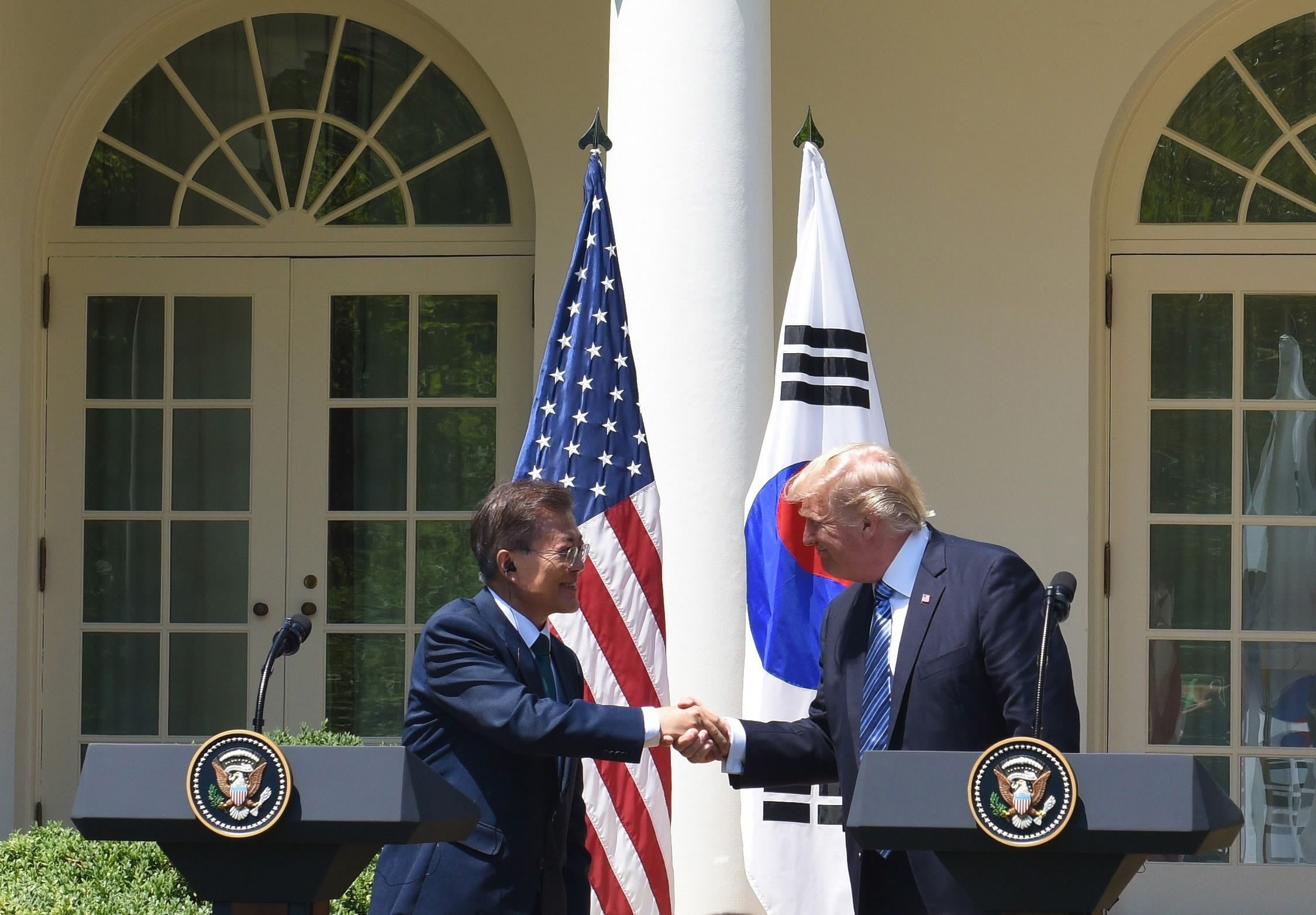
US President Donald Trump and South Korean President Moon Jae-in shake hands in Washington on June 30, 2017. /VCG Photo
US President Donald Trump and South Korean President Moon Jae-in shake hands in Washington on June 30, 2017. /VCG Photo
Although Beijing insists on denuclearization on the Korean Peninsula, a strengthened US-South Korea-Japan trilateral alliance nearby is not what China would like to see.
China has shouldered enormous pressure the last few months by strictly implementing UN Security Council sanctions. Recently, China’s Ministry of Commerce issued a notice banning exports of condensate and liquefied natural gas to the DPRK and a complete ban on textile imports from the DPRK. Pyongyang’s oil price has started to rise and further economic hardship is expected.
As China has always said, sanctions are not the aim and military strikes are not the solution. However, as the US, South Korea and Japan strengthen their alliance, the possibility of a direct military confrontation is increasing on the Korean Peninsula.
When you hold a hammer in your hand, every problem looks like a nail. The international community must not only firmly stop the DPRK from developing nuclear weapons, but also prevent the military hawks taking dangerous risks.
(This piece was originally published on Global Times. The author is a senior research fellow with The Charhar Institute and an adjunct fellow at the Chongyang Institute for Financial Studies at Renmin University of China. The article reflects the author's opinion, and not necessarily the views of CGTN.)
Source(s): Global Times

